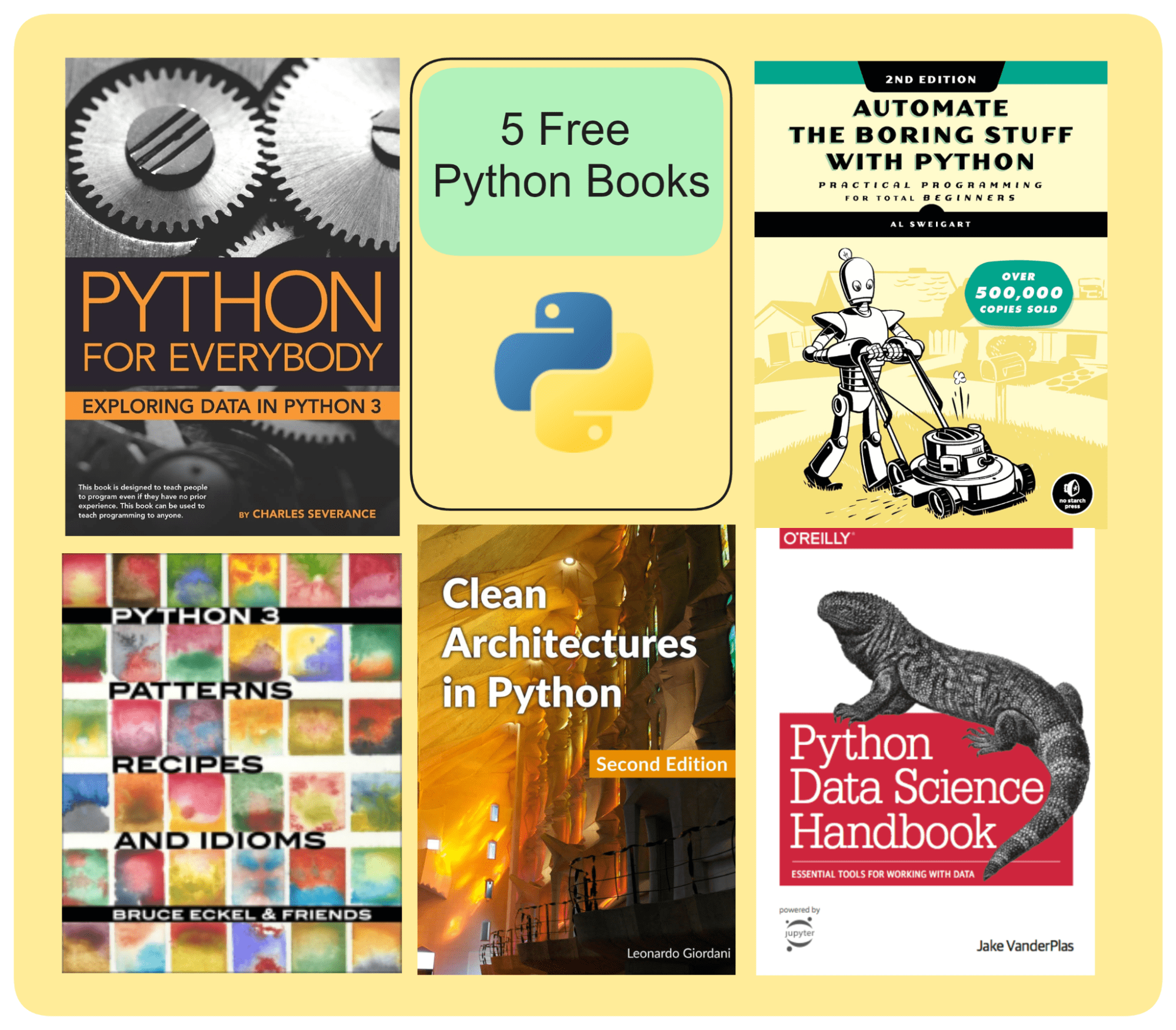5 Free Books to Help You Master Python
From the basics of Python to clean architecture and more, here are five free books to level up your Python skills.

Image by Author
When you’re learning a new programming language or tech stack, you’ll often be overwhelmed with the bazillion resources—books, courses, tutorials and more—available to get started.
If you’re an experienced programmer learning Python, just-in-time learning to complete specific projects probably works better. But if you’re looking for a complete learning path, you may prefer a structured learning curriculum—coupled with projects—to become familiar with the language.
Here, we present five Python books to help you become proficient with the features of Python and build maintainable applications. Whether you are a beginner or an experienced Python programmer, these books will help you broaden your understanding of the language.
1. Python for Everybody: Exploring Data in Python 3
Python for Everybody by Dr. Charles Severance (Dr. Chuck) presents a code-first approach to learning the Python programming language. It's one of the best books to pick up if you are just getting started with Python.
From installing Python to web scraping and working with common data formats this book covers a good breadth of topics—along with practice exercises and solutions. You can also follow along with the Python for Everybody lecture—freely available—on the freeCodeCamp YouTube channel.
The topics covered in this book include:
- Variables, expressions, and statements
- Conditional execution
- Functions
- Loops and iteration
- Working with strings and files
- Lists, tuples, and dictionaries
- Regular expressions
- Network programming
- Using web services
- Object-Oriented Programming (OOP)
- Databases
- Data visualization
Start reading: Python for Everybody (PY4E)
2. Automate the Boring Stuff with Python
Automate the Boring Stuff with Python by Al Sweigart is another excellent beginner-friendly resource to learn basic to intermediate Python concepts.
You’ll learn the basics like built-in data structures, control flow, and exception handling. In addition, you’ll learn to write Python scripts to automate tasks like searching through files, downloading files from the web, processing PDFs and more.
Here's an overview of some of the topics covered in this book (in addition to the basics):
- Pattern matching with regular expressions
- Input validation
- Reading from and writing to files
- Debugging
- Web scraping
- Working with spreadsheets, PDF, CSV and JSON in Python
- Scheduling tasks
- Manipulating images
- GUI automation
Start reading: Automate the Boring Stuff with Python
3. Python 3 Patterns, Recipes, and Idioms
Python 3 Patterns, Recipes and Idioms is a book for intermediate Python programmers who are already familiar with the features of the language and are looking to level up.
The book starts with the review of Python functions and classes and covers the following:
- Initialization and clean up of instances
- Unit testing and test-driven development in Python
- Decorators
- Meta programming
- Generators, iterators, itertools
- Design patterns and pattern refactoring in Python
Start reading: Python 3 Patterns, Recipes and Idioms
4. Clean Architectures in Python
When you go beyond simple python scripts and start building applications, you need to understand clean architecture and build production-ready apps.
Clean Architectures in Python by Leonardo Giordani is a free book that covers:
- Clean architecture fundamentals
- Components of clean architecture
- integration with external systems (Postgres and MongoDB)
- Running a production-ready system
Start Reading: Clean Architectures in Python
5. Python Data Science Handbook
You’ve gained familiarity with core Python and the functionalities of built-in modules. You’re also aware of the best practices to write clean Python code. So what's next?
If you’re looking to get started with data science, you also need to add a few Python data science libraries. The Python Data Science Handbook is a comprehensive resource to pick up the basics of cleaning, analyzing, and manipulating data.
The book covers python concepts like Python magic commands, debugging, and profiling code. If then covers enough ground to help you get started with Python data science libraries and build machine learning models. Here’s an overview:
- NumPy
- Pandas
- Matplotlib
- Machine learning
Start reading: Python Data Science Handbook
Wrap-Up and Next Steps
As mentioned, it is important to apply what you learn by building small projects that you're interested in! These books will serve as your companion in the process.
When you start building applications, it's possible that you may introduce subtle anti-patterns in your code. So regardless of the programming language that you are building with, be sure to read Clean Code and The Pragmatic Programmer to build better applications.
Bala Priya C is a developer and technical writer from India. She likes working at the intersection of math, programming, data science, and content creation. Her areas of interest and expertise include DevOps, data science, and natural language processing. She enjoys reading, writing, coding, and coffee! Currently, she's working on learning and sharing her knowledge with the developer community by authoring tutorials, how-to guides, opinion pieces, and more.
